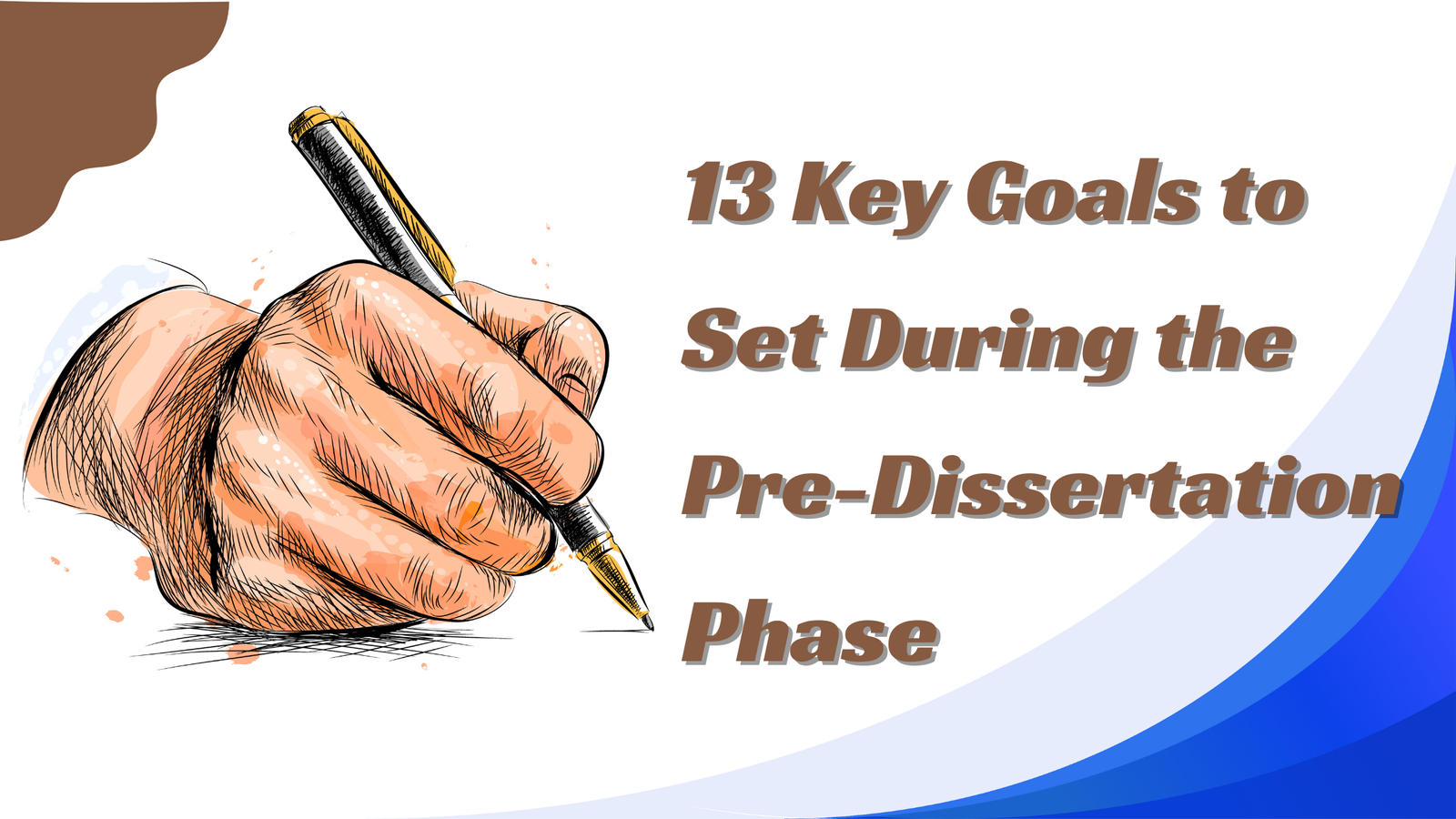13 Key Goals to Set During the Pre-Dissertation Phase
- 1 What is a Pre-Dissertation?
- 2 A List of Major Goals to Set During the Pre-Dissertation Phase?
- 2.1 1. Define Research Interests and Objectives
- 2.2 2. Conduct Literature Review
- 2.3 3. Identify a Dissertation Committee
- 2.4 4. Develop a Research Proposal
- 2.5 5. Refine Research Questions and Objectives
- 2.6 6. Develop a Research Timeline
- 2.7 7. Identify and Secure Research Funding
- 2.7.1 Funding Sources for Research
- 2.7.2 How to Write Funding Proposals?
- 2.7.3 Financial Planning and Budgeting
- 2.8 8. Develop a Data Management Plan
- 2.9 9. Specify a Writing Routine
- 2.10 10. Attend Academic Conferences and Workshops
- 2.11 11. Develop a Plan for Data Analysis
- 2.12 12. Establish a System for Organising References
- 2.13 13. Develop a Plan for Disseminating Research Findings
- 3 What are Preliminaries in a Dissertation?
- 4 End Note
It can be delightful and scary when students enter the pre-dissertation stage as graduates. During this phase, students are supposed to develop their research ideas and probably come up with an exact description of their potential dissertation project. Clear objectives allow students to stay focused, motivated, and accountable, leading to a thriving research experience.
Establishing pace and direction in this phase motivates students and is a key to setting achievable goals. In addition, a writing plan helps students stay on track and suppress some challenges faced during their studies.
So, in this article, we will explain the top 13 goals that every student should set before starting to write their dissertation. Before discussing the goals, let’s first clarify what a Pre-Dissertation is.
What is a Pre-Dissertation?
If we talk about pre-dissertation meaning, it is an initial stage of collecting data, proving a hypothesis, or determining whether a research question or set of methods is feasible. A few months to one year of pre-dissertation includes reading, researching, planning your work, and preparing your topic for discussion.
Now, let’s learn some aims students should focus on before starting their research work.
A List of Major Goals to Set During the Pre-Dissertation Phase?
Developing specific goals during the pre-dissertation stage will underpin your research and make your dissertation possible. You must follow a clear, measurable, attainable, relevant, and time-bound (SMART) approach. However, if you do not have enough information, you can ask experts to do my dissertation for me. They follow SMART objectives that correlate with your research interests, dissertation requirements, and professional aims.
The below-mentioned goals will save time, enable you to manage the pre-dissertation stage effectively, and create a solid foundation for your dissertation. During pre-dissertation, students should:
- Define research interests and objectives
- Conduct literature review
- Identify a dissertation committee
- Develop a research proposal
- Refine research questions and objectives
- Develop a research timeline
- Identify and secure research funding
- Develop a data management plan
- Establish a writing routine
- Attend academic conferences and workshops
- Develop a plan for data analysis
- Establish a system for organizing references
- Develop a plan for disseminating research findings
Let’s explore these objectives in detail.
1. Define Research Interests and Objectives
The pre-dissertation phase of a PhD program includes the definition of research interests and objectives. Therefore, to ensure that the research concisely contributes to one’s academic and professional goals, one should identify a clearly defined topic of study.
After that, the research objectives should be established. For a productive research process, several significant judgments are needed to define research claims and objectives.
Determine Your Research Interests
- Examine your educational history and professional experience to determine what interests you and suits your strengths.
- Investigate the gaps and modern research developments in the discipline you need to win.
- Think about how your observation could affect the vicinity, business, or society and how it would help with realistic issues.
Specify the Goals of the Research
- Give a transparent rationalization of the main study question that your observer is attempting to solve.
- Determine the ideal desires of the research, considering the key factors and ideas.
- Establish the boundaries and scope of the study, in addition to the population, pattern, and strategies for data records.
2. Conduct Literature Review
An essential step in a pre-dissertation process is to conduct a literature review. The main goal of evaluating the literature is to summarize all the research.
This may lead to finding the gaps and laying the groundwork for the study. To ensure a complete analysis, it’s critical to set clear objectives for the literature review throughout the pre-dissertation process.
The following are the key marks to establish:
- Specify the hypothesis or research question.
- Determine pertinent search phrases and databases.
- Make a thorough search of the literature.
- Analyze the studies’ quality and applicability.
- Combine the results.
- Determine the gaps and areas that require more study.
3. Identify a Dissertation Committee
The researcher must find the dissertation committee to ensure a successful and smooth research process. One of the major tasks is to decide on a research topic and the purposes of the work, which will become the foundation for the whole dissertation. The committee may help a researcher identify a research gap, develop a clear hypothesis, and formulate a research topic.
Another essential task is to create a feasible timeline with milestones and deadlines to guide a researcher’s work and help ensure the dissertation is completed on time. The committee’s function is to provide the student with recommendations for literature and the possibility of writing a comprehensive literature review.
4. Develop a Research Proposal
The research proposal distinctively brings out the importance and quality of your project. It shows how capable you are of performing the proposed investigation. Its purpose is to comprehensively investigate the research topic that contributes to acknowledging literature reviews in the field. The proposal guarantees well-conducted and structured academic research by outlining a comprehensive framework for the study’s assumption, methodology, and expected outcomes.
A well-constructed proposal also helps the writers decide on their research problem and identify any barriers to improving the quality and significance of their dissertation. This way, writers can enhance their analytical and key thinking skills. This may lead to developing informative knowledge relevant to their field of study and elevate their confidence to perform original research.
5. Refine Research Questions and Objectives
One of the primary tasks in preparing a dissertation for successful completion is determining research questions and goals during preliminary research redesign. At that point, the research problem should be identified, the knowledge gap should be determined, and the study’s goals should be set. The main task is to create a precise, focused research topic to guide further research.
The following objectives you need to set before starting your investigation:
- Describe the problem of the research.
- Create research questions.
- Specify your research goals.
- Formulate a research hypothesis.
- Determine the extent of the study.
6. Develop a Research Timeline
Developing a research schedule and objectives is an integral part of the pre-dissertation phase of a PhD program. It is vital at this stage to guide the course of such a fruitful dissertation endeavor. All professional dissertation writers in the UK follow a pre-defined research timeline to manage and organize a project, thus ensuring the timely delivery of a well-written project.
As a student, it is also vital for you to set a timeframe before starting working on your dissertation. The following benchmarks might be found in a standard pre-dissertation research timeline:
7. Identify and Secure Research Funding
Getting research funding is also an essential part of the pre-dissertation stage. When looking for funding for your research, it is significant to create connections and networks at the pre-dissertation stage. You can make connections with possible partners and financial advisors.
Keep up-to-date on the most recent advancements and trends in research. It is also essential for you to learn about the prerequisites and methods of financing. Join like-minded scholars and institutions for research work.
Funding Sources for Research
Explore the various ways of funding, check eligibility to get through, and find a spot for your study work. A few sources can provide you with funds for your research.
- Governmental funding organizations (Department of Education, NIH, NSF…)
- Private foundations (like Carnegie, Mellon, and Ford)
- Businesses and corporations
- University research institutes and offices
- Platforms for crowdfunding
How to Write Funding Proposals?
To write a funding proposal for your research work, you have to add the following details:
- Purpose of the research and its question
- Approaches and techniques
- Impact and anticipated results
- Budget and rationale
- Timeline and significant events
- Practice writing research proposals to help you sharpen your ideas and prepare for upcoming funding submissions.
Financial Planning and Budgeting
Financial security is the most important factor in long-term stability and can only be achieved through intelligent budgeting practices. A well-crafted budget helps include:
- Costs related to employees and personnel
- Tools and components
- Expenses for accommodations and journey
- Reserve money
- Make a budget as a part of your economic plan to manage the funds for study.
- Make a schedule for your investigation that includes the following:
- Important dates and benchmarks
- Reporting obligations and progress updates
- Backup plans in case of delays or setbacks
You can target the pre-dissertation fellowship by monitoring your work and modifying your plan.
8. Develop a Data Management Plan
The students must form a Data Management Plan (DMP) at the pre-dissertation stage, articulating crucial goals for efficiently collecting and organizing data. By setting clear goals, researchers can promise data consistency and quality. They should consider setting goals for data documentation (standards for meta-data, a data dictionary, and procedures in place to facilitate collaboration and share the results).
By developing a detailed DMP in the pre-dissertation stage, researchers can ensure their data is well-managed and enable a more productive research process later.
9. Specify a Writing Routine
One of the most essential parts of a pre-dissertation phase is arguably forming a writing schedule as it sets things for beneficial and constructive research. Establishing distinct aims lets you target your work and keep you from straying off the ground. An established routine and calm working environment can help you to write more, feel better, and generate better quality work.
Think about the following essential objectives to set during the pre-dissertation stage to create a productive writing routine:
10. Attend Academic Conferences and Workshops
Academic conferences and workshops are also essential to preparing for a PhD. One important goal to achieve in this period is to connect with subject-matter experts. Presenting research proposals, participating in panel discussions, and connecting with top academics can also contribute.
Conferences also provide an opportunity to learn about the latest methods and discoveries and identify areas where further research is needed. Additionally, attending academic conferences and seminars can assist in sharpening essential skills like communication, time management & public speaking.
11. Develop a Plan for Data Analysis
Creating a radical plan for workshops and evaluation is integral to a pre-dissertation level. This plan acts as an avenue map, supporting the researcher in gathering, analyzing, and interpreting findings to complete the dissertation. During the pre-dissertation level, the following planned timetable for records analysis and workshops should be followed:
- Choose the technique of analysis (predictive, inferential, or descriptive).
- Decide which statistical methods and tools (SPSS, R, and Python) to utilize.
- Create a plan for pre-processing and data cleansing.
- Make an agenda and timeline for the evaluation of the record.
- Determine the key contributors and stakeholders for the workshops (e.g., the studies consultant, committee members, peers, and so on).
- Arrange seminars on different time intervals in the investigation process:
- Workshop 1 (Week 4-6): Research design and methodology
- Workshop 2 (Week 10–12): Gathering and cleansing data
- Workshop 3 (Week 16–18): Interpreting and analyzing data
- Workshop 4 (Week 20–22): Findings and conversation
12. Establish a System for Organising References
Effective reference management is one of the most essential parts of academic writing for researchers. To guarantee that you can quickly find and use pertinent sources during your research journey, you must create a method for organizing references.
This section will walk you through building a solid reference management system to help you organize your research and write a dissertation of the highest caliber.
- Select a style of referencing.
- Employ a tool for reference management.
- Install google calendar or outlook.
- Create a system for taking notes.
- Make a research log, label your files, and arrange them.
- Create a structure for listing notes and references.
13. Develop a Plan for Disseminating Research Findings
One of the most important goals in a research project’s pre-dissertation phase is creating a plan for sharing research findings. This stage seems very difficult for students, and they seek dissertation writing companies to get support promptly. However, one can quickly achieve this goal with a few essential techniques.
To create a plan for disseminating your research findings, you have to:
- Create compelling content based on your reader’s interest.
- Manage the timetable and the resources.
- Ensure to use descriptive language so that your target audience can understand.
A carefully thought-out distribution strategy ensures that the study results are shared with the right people, have the most significant possible impact, and enhance the field’s understanding.
What are Preliminaries in a Dissertation?
Preliminaries in the dissertation include a title page, copyright page, approval report for the thesis or dissertation, summary, dedication, frontispiece, epigraph, list of contents, tables, figures, symbols, abbreviations, and acknowledgments.
How to Write a Preliminary?
To write a preliminary for your dissertation, you need to keep the following points in mind:
- Roman numerals in lowercase are used to number the preliminary pages.
- Don’t number your copyright or title pages.
- Page 1 does not exist in the manuscript.
- Roman numeral (ii) is used to start numbering.
End Note
During the pre-dissertation phase of the academic journey, students can outline the main goals and establish a successful research project. Formulate a research question and write a compelling literature review to identify the theoretical framework. By setting significant goals during this phase, you can be sure that your studies are conducted as planned, and you have a chance to make valuable contributions to your profession.
In addition, setting up essential goals throughout the pre-dissertation period can provide you with an experience that will help you get through the problems of the dissertation procedure. You can also address the challenging task of writing a dissertation by setting goals to achieve academic excellence.




















